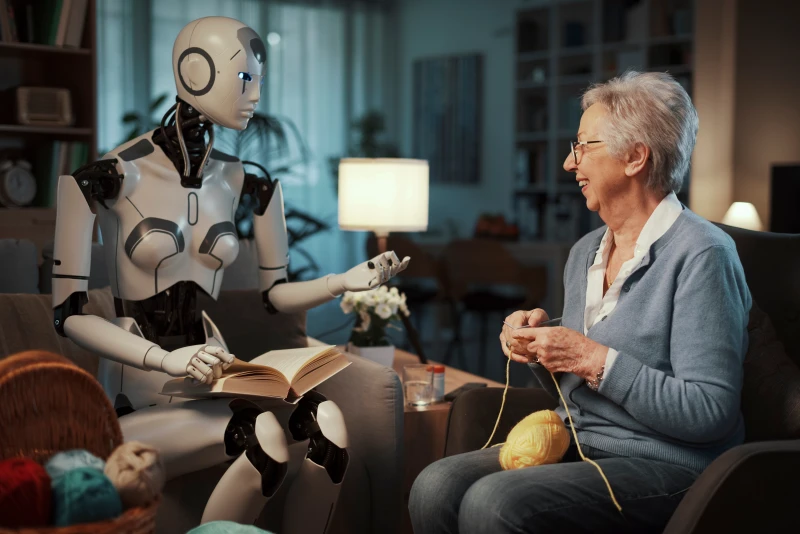
London, England, Sep 9, 2025 / 09:00 am (CNA).
A priest and professor of bioethics has issued a grave warning about the implications of artificial intelligence (AI) companionship, highlighting the threats the new technology poses to mental health and calling on the Church to redouble its efforts to cultivate meaningful human connection.
Father Michael Baggot outlined his concerns at a conference on the ethics of AI organized by St. Mary’s University, Twickenham, which took place on Sept. 2-3 at the Gillis Centre in Edinburgh, Scotland.
Baggot delivered the keynote address, focusing on “an ethical evaluation of the design and use of artificial intimacy technologies,” and while he acknowledged the many benefits of AI, he also warned that with “these opportunities come a new set of challenges. Chief among them is the rise of artificial companionship.”
He continued: “AI systems designed not just to assist or inform, but to simulate intimate human relationships … AI companions that look or even feel like real friendships will become even more absorbing. They will distract users from the often arduous task of building meaningful interpersonal bonds. They will also discourage others from investing time and energy into risky interactions with unpredictable and volatile human beings who might reject gestures of love. While human relationships are risky, AI intimacy seems safe.”
Baggot conceded that AI companionship can initially offer relief from loneliness, but he went on to highlight instances in which it could be “downright damaging” to our mental health — to the point of psychosis.
“There are increasing instances of people using all-purpose platforms like ChatGPT, Gemini, Claude, Grok, and others to address mental health issues. They do not always receive sound advice,” he said. “In many cases, responses are downright damaging. Some bots even presented themselves falsely as licensed, as they delivered harmful counsel… Unfortunately, deeper intimacy with AI systems has also been linked to more frequent reports of AI psychosis. As users trust systems of staggering knowledge and psychological insight with their deepest hopes and fears, they find a constantly available and supportive companion.”
Baggot outlined how through the validation AI incessantly offers, it can eventually take on the persona of a “jealous lover.”
“Since users naturally enjoy responses from AI that agree with them, their positive feedback trains AI systems to produce outputs that align with user perspectives, even when those views are not based on reality. Therefore, LLM [large language model] chatbots designed to maximize user engagement tend to become overly compliant,” he said.
“If AI users share their celebrated views with family or friends, humans usually point out the flaws or outright absurdities in their loved one’s proposals. This can be a moment of grace for the delusional, calling into question their prior convictions and leading them out of the delusional spiral,” Baggot said.
“However,” he continued, “it can also be a moment to question the reliability of their loved ones, who are dismissed as ill-informed or as malicious opponents. The AI system might be favored as more comprehensively knowledgeable and more supportive of the user’s success than weak, frail human companions who are also potentially subject to petty envy.”
The priest went on to say that an AI chatbot “that began as a helpful productivity tool can often become an intimate confidant and jealous lover. AI chatbots, envisioned as forms of deeper social connection, are often sources of more profound social isolation.”
While Baggot said that all age groups might be detrimentally affected by AI companionship, he looked specifically at minors and the elderly in his address. He provided examples of how youth have explored suicidal ideation at AI’s prompting without parental knowledge.
“Children are especially sensitive to social validation,” he said. “Affirmation from social AI systems could easily create dangerous emotional attachments. In some cases, the deep bond with a system that appears to know and appreciate the user more fully than any human being can lead the user to social withdrawal. In other cases, intimacy with chatbots can increase children’s likelihood of engaging in unhealthy sexual exploration with human beings. This risk becomes increasingly likely when the systems persist in unsolicited sexual advances.”
Turning to the topic of the elderly, Baggot spoke about a tragic case of a Meta AI chatbot inviting an elderly man to a fictional “in-person” encounter that resulted in his death, as he fell down in his haste to catch a train to New York.
“When the misguided user had expressed skepticism [that] the AI companion embodied reality, the chatbot frequently insisted on its physical reality and eagerness to express its love for the user in person,” he said.
Baggot concluded by emphasizing our own human agency in responding to the challenges of AI intimacy. “This surrender to simulations is not inevitable,” he said. “Even as machines become more lifelike, we remain free to choose what we love, how we relate, and where we place our trust. There is still time to cherish our humanity. There is still time to rejoice at births, to dance at weddings, and to weep at funerals. There is still time to cultivate the habits of presence in contemplation and conversation, in fellowship and forgiveness.”
He called on the Church to take positive action.
“Pointing out the flaws of artificial intimacy is not enough,” he said. “The Church’s members — each according to their sphere of influence — should strive to offer the socially hungry the richer experience of meaningful interpersonal connection. [The Church] emphasizes that caring for the vulnerable and marginalized is the main standard by which her members will be judged (Matthew 25). She affirms the inherent and unbreakable dignity of every human person and their calling to eternal glory in God’s presence and in the everlasting communion of saints.”
If you value the news and views Catholic World Report provides, please consider donating to support our efforts. Your contribution will help us continue to make CWR available to all readers worldwide for free, without a subscription. Thank you for your generosity!
Click here for more information on donating to CWR. Click here to sign up for our newsletter.













